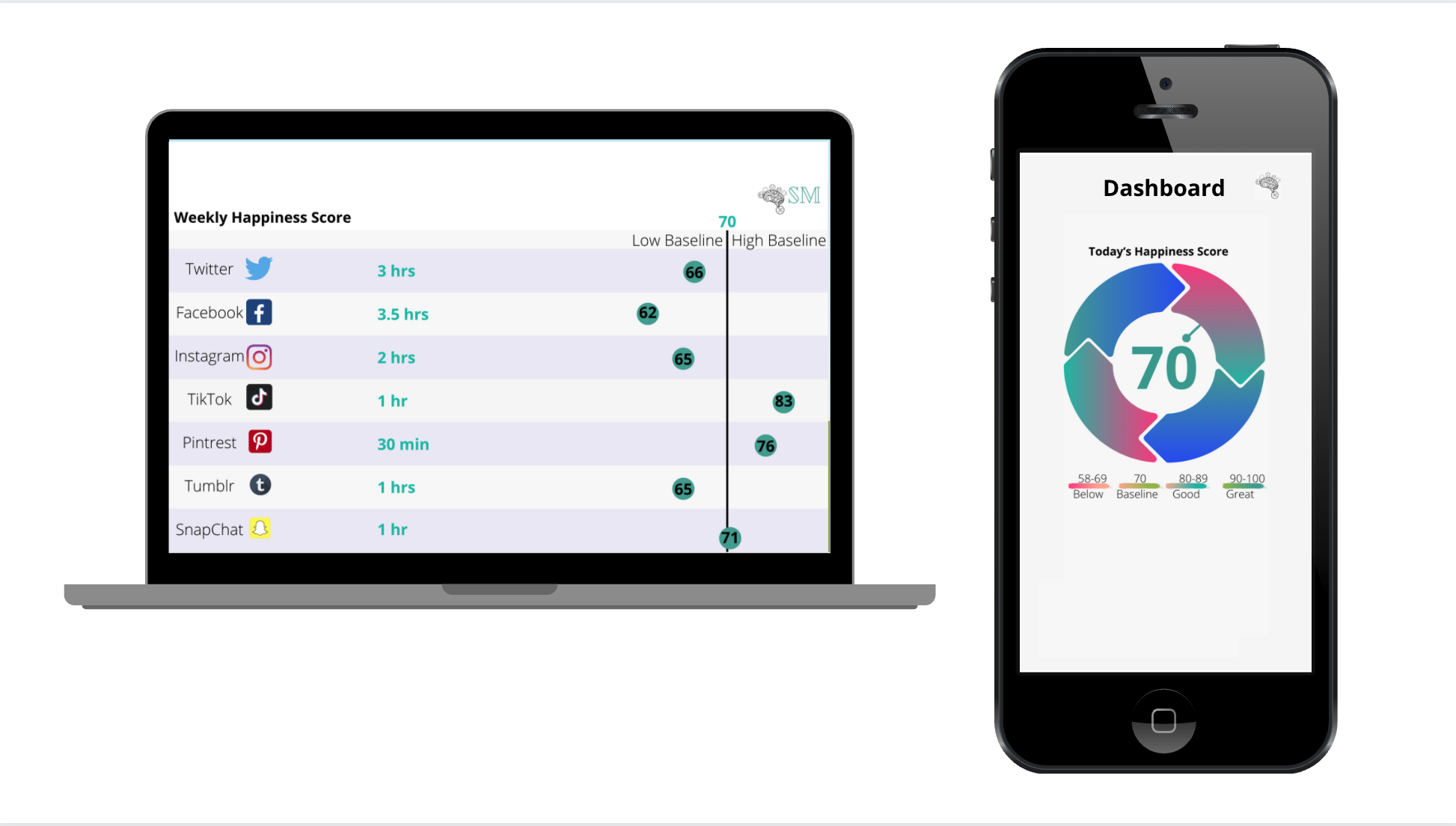ShuffleMe Uncovering How Social Media Can Impact Mood
 The software provides a dashboard with the person's average daily emotional score and a list of social media content that caused mood decline.
The software provides a dashboard with the person's average daily emotional score and a list of social media content that caused mood decline.
Subscriber Benefit
As a subscriber you can listen to articles at work, in the car, or while you work out. Subscribe NowBritain Taylor is determined for good to come from heartbreak; when several friends committed suicide when she was in high school, she resolved to understand how social media impacted her friends’ mental health. An early social media adopter—she was the 16th user on Myspace, where she accumulated more than a million followers—Taylor is now applying her tech expertise to launch Bloomington-based ShuffleMe. More than 100 Hoosier mental health practitioners are now testing the startup’s software to help them understand how social media is causing patients’ mood decline.
“[The ShuffleMe] software isn’t meant to tell you, ‘Don’t go on social media.’ We actually encourage it,” says Taylor, who is the company’s chief executive officer. “ShuffleMe is designed to help people understand which social media content is impacting their mood, so they can decide on what we call self-directed behavioral change; you can decide how you want to take that information. Do you want to mute that profile, unfollow it or sit down with a practitioner? He or she could help you understand how to train your mind to not be affected by that content, so your mood doesn’t decline when you see it again or see something similar to it in the future.”
Taylor has plotted her educational career to execute her mission of creating ShuffleMe; after an undergrad degree in psychology, she earned two master’s degrees (industrial engineering and an MBA) and will complete her doctorate in intelligent systems engineering at Indiana University next year.
The ShuffleMe software aims to fulfill what she set her sights on as an 18 year old: to “develop a tool that can track mood changes in real-time and protect [users’] vulnerability to depression.” In its current form, users download the ShuffleMe software from the startup’s website and allow access to their webcam. When users visit any social media site, the software is activated in the background and begins using the webcam to analyze the user’s facial expressions when they’re on social media websites. The user’s facial expressions are matched to a scientific database of facial expressions well-established in psychology.
“[ShuffleMe] will calculate your emotional score and take the average of that; maybe you had 30% happiness, 12% negative, plus some neutral [expressions]. Then, it will give you a score,” says Taylor. “For you as an end user, you’ll access your dashboard and see your average daily emotional score and also a list of social media content that caused your mood decline.”
Privacy is an important focus for ShuffleMe; Taylor says the software deactivates as soon as the user leaves social media websites, and the camera and browsing data are deleted from the startup’s server after calculating the emotional score. The software is currently designed to be used on a laptop or computer, but ShuffleMe will begin testing its smartphone app in August.
Taylor’s original idea for ShuffleMe focused on the end user, but the startup shifted its target audience to mental health practitioners; the young company realized an unmet treatment opportunity when completing the National Science Foundation (NSF) I-Corps program. Taylor says clinicians typically rely on the PHQ-9, a nine-question assessment used in the primary care setting to screen for the presence and severity of depression.
“A lot of practitioners understand that social media is becoming part of their patients’ mood decline, and they have, essentially, been using health assessments like PHQ-9 to help detect mild, moderate or severe depression,” says Taylor. “That doesn’t necessarily help with how social media is impacting their patients. We realized they were looking for a tool, and that’s how we transitioned ShuffleMe into being a product for practitioners, so they can distribute it to their patients and get some feedback on them to help with one-on-one sessions and treatment.”
About 120 practitioners are testing ShuffleMe, including clinicians at IU Health and Riley Hospital for Children at IU Health, and counselors from Monroe County Community School Corp., who work mostly with high school students.
ShuffleMe recently launched a second closed beta test focused on end users; about 2,000 students at IU, Purdue University and Ball State University are also using ShuffleMe and providing feedback.
Taylor plans to keep ShuffleMe’s roots firmly planted in Bloomington. She says working with IU’s Shoemaker Innovation Center “has pushed ShuffleMe way further than we thought we could go.” Bloomington nonprofit coworking center The Mill also named ShuffleMe as the winner of its Spark Business Plan Competition. The startup earned statewide recognition when TechPoint named Taylor as a “Rising Entrepreneur Award” nominee for its 2021 annual Mira Awards.
Looking forward, ShuffleMe hopes to grow its revenue by transitioning beta users to paying customers, close its pre-seed round of funding and open a brick-and-mortar presence in Bloomington.
“We hope to soon establish a building on Kirkwood [Avenue] in Bloomington. In 10 to 15 years, I see us having 50 to 100 employees there,” says Taylor. “What we’re most excited about is for our product to be used by practitioners, to be very impactful, save lives and bring happiness to people who are using social media—creating that healthier relationship with social media.”
Taylor explains how she and ShuffleMe Chief Technology Officer Bramsh Chandio and Designer Ike Obj are combining their education at IU with building their startup.
Taylor says the doctorate program at IU is dovetailing with the launch of ShuffleMe.
